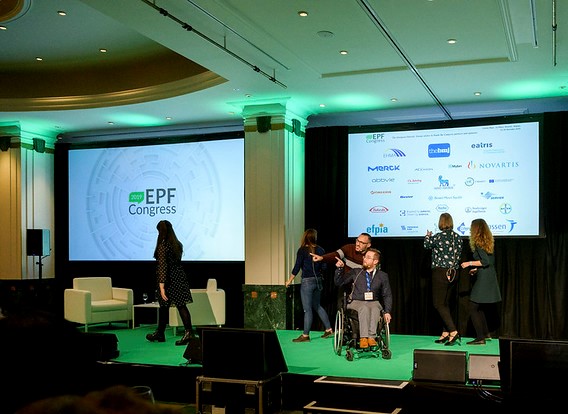Patients in the Spotlight - Issue #1
Issue #1: Patient Advocacy Through Theatre and Storytelling
We live in a storytelling society. From talk shows to Twitter, everyone feels compelled to tell their own story, however trivial. We post what we had for breakfast on Facebook and carefully construct a narrative of holiday images on Instagram. But what about patients and their stories? In the last three months of lockdown, they have often been more vulnerable to COVID-19 than healthy people, and unable to access their treatment; others have been more fortunate; others have been living in isolation. Where are their stories? We need to hear them.
But stories need to be good stories if they want to get a hearing. If a film has a strong storytelling component it is more likely to have a lasting impact. Our brains are hardwired to absorb and help us remember stories. If the language is appealing and the chronology of events understandable, the stories will sink in more effectively. This is why we remember our childhood stories or why a story about food may resonate with us (if told well, we may even imagine the taste of the food, and get a little hungry!) It is why stories that are based on true events or stories told in “real time” have even more of an impact – because there is an element of sincerity which we are more likely to trust, absorb and even react to.
This is precisely why real-life experiences told by patients resonate with us. It is because we have all been patients ourselves at some stage in our lives, or we may have a loved one suffering from a chronic condition. We may even have a condition ourselves that we may not want to talk about. But when real life experiences come into the picture or onto the stage, that is indeed a whole new story. Patients’ stories resonate with us because we identify with them. We sympathise with them instinctively.
Patient advocacy groups need to make better use of patient storytelling and here at the European Patients Forum, we are actively working to precisely do that. Our Youth Group is comprised of 9 young patients (aged 18-29) from all over Europe with different chronic conditions. We meet up twice a year to come up with ideas to strengthen the voice of young patients in the field of health policy. Last year, we all sat down together to brainstorm about ways the Youth Group could take part in our annual Congress. We talked about how we could make use of patients’ stories and then it hit us: we decided to perform our own patient narratives at the Congress in a series of roleplay scenes, improv-style.

I had the honour of being director, but I cannot really take the credit for any of the acting or the dialogue: the young patients performed their own real-life scenarios at the Congress. These were day-to-day situations of chronic disease management, highlighting a situation of vulnerability or discrimination. “We believed this to be important as it gave the audience a glimpse into the daily life of a patient and how an incident of discrimination or ill treatment can impact on them”, says Youth Group member Marcus Ward. However, we also staged positive examples of patients engaging in health policy making. The messages were well received, and we have come to realize that by acting and speaking about something real, our patients become empowered and the audiences engaged with their expressions.
Could theatrical performance be a new form of patient advocacy? We at the European Patients’ Forum like to expand on it. What we want to promote is not just the traditional kind of advocacy, but to help patients to use the power of their own narratives to speak up. As a result, we are not just speaking on behalf of patients, we are promoting advocacy by the patients themselves.
In each newsletter, we will be developing this idea with you. We want to publish young patients’ stories and talk about the benefits of Patient Advocacy through Theatre and Storytelling (PATS). Let us know what you think and continue to watch this space and engage with us.
Emily Bowles (EPF Communications Officer)
